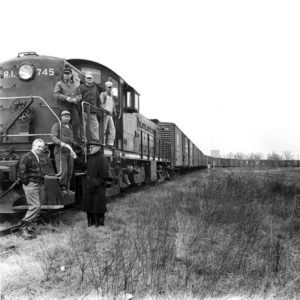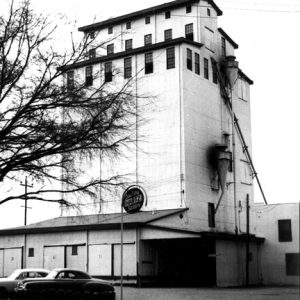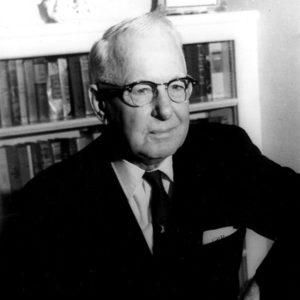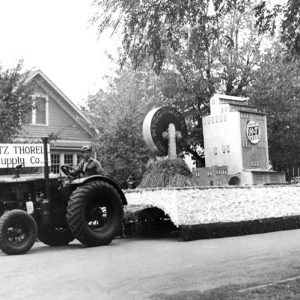calsfoundation@cals.org
Jacob Hartz Sr. (1888–1963)
Jacob Hartz Sr. was a pioneer in the soybean industry. His vision of the use of the soybean plant as a rotation crop in the nitrogen-depleted cotton and rice fields of Arkansas County led to the growth of a soybean industry that today is a $500 million cash crop in Arkansas, where 3.2 million acres are grown annually.
Jacob Hartz was born to German immigrants George and Susanna Hartz in Racine, Wisconsin, on April 4, 1888. He was the third of eight children. After completing six years of formal education, his first work experience was as a clerk in a general store.
In 1909, he married Mary Isabelle Smith, with whom he had eight children, and became an Arkansas sales representative for P. and O. Plow Company in Little Rock (Pulaski County). He continued in this capacity until 1917, when he and his family moved to Wheatley (St. Francis County), and he became a founding partner and general manager of Hartz Hardware and Implement Co. In 1924, Hartz relocated to Stuttgart (Arkansas County) and in 1925, with Alfred Ralph Thorell, formed Hartz-Thorell Supply Co., a McCormick-Deering dealership.
Realizing the potential of the soybean plant to replenish soil nutrients and also enhance weed control, Hartz obtained twenty bushels of the Laredo soybean seed from growers in Illinois. He arranged for the planting of this crop in 1925, producing Arkansas’s first soybean crop. Hartz guaranteed the farmers’ crop, although he frequently had no buyer and was left with a surplus.
Hartz founded Jacob Hartz Seed Co. in 1925 as a division of Hartz-Thorell Supply Co. In 1927, Hartz-Thorell owned the first seed cleaner in the state, and in 1936, the company built its first seed-processing plant.
As the value of the soybean was recognized, Hartz and Hartsell Banks, director of the Rice Branch Experiment Station of the University of Arkansas, began actively promoting soybeans to growers in neighboring states. Consequently, Hartz became active in helping the experiment station acquire additional land to produce foundation-grade seed rice, oats, and soybeans.
The Hartz-Thorell partnership dissolved in 1942, and Hartz became president of an independent Jacob Hartz Seed Co., Inc. World War II cut off the supply of vegetable oil from the Pacific, creating a ready market for the soybean and soy oil.
Hartz’s health began to decline in 1946, and his sons Jake, Bernard, Marion, Alfred, and Richard joined the operation in various capacities, with Jake assuming the role of the president of the company. Hartz himself continued to work in an advisory capacity until his death.
Hartz helped form the Arkansas State Plant Board and served as a member of its board of directors from 1942 until 1946. He also helped form the Arkansas Seed Dealers Association, the Southern Seedmen Association, and the American Soybean Association. In 1949, he received the American Soybean Association’s award for outstanding achievement in the soybean industry.
Hartz died on October 4, 1963, and is buried in Holy Rosary Cemetery in Stuttgart. Jacob Hartz Seed Co. became a leader in the research of new seed varieties, crop improvement, and market development and was recognized in 1983 by the U.S. Department of Commerce for these accomplishments. In 1995, Hartz was posthumously inducted into the Arkansas Agriculture Hall of Fame.
For additional information:
Baker, Robert L. “Hartz Seed…Soybean Specialist.” Inside Story: The International Harvester Magazine (Fall 1965): 26–31.
“Hartz—The Man Who Brought the Soybeans to Arkansas.” Esso Farm News 14 (Fall 1956): 10–12.
“Hartz Rites Conducted in Stuttgart.” The Guardian [Little Rock]. October 11, 1963, p. 1.
“Jacob Hartz, Sr., Arkansas Seedsman, Expires.” The Rice Journal 66 (December 1963): 18.
Jane B. Hartz
Stuttgart, Arkansas
 Jake Hartz, Jr.
Jake Hartz, Jr.  Hartz-Thorell Seed-Processing Plant
Hartz-Thorell Seed-Processing Plant  Jacob Hartz Sr.
Jacob Hartz Sr.  Rice Festival Parade Float
Rice Festival Parade Float 




Comments
No comments on this entry yet.